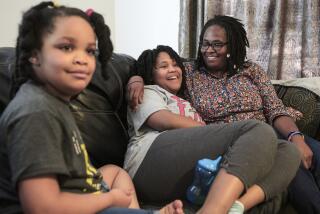Proteins May Spot Autism, Researchers Say
- Share via
Autistic children have abnormalities in their immune systems and unusual constellations of proteins in their blood that may be an indicator of the disorder, UC Davis researchers said Thursday.
The findings “suggest the possibility for future diagnostic tests for autism at birth” and may mean that “we can get children into effective treatment much earlier than is now possible,” said Helen Tager-Flusberg of the Boston University School of Medicine, who chaired the Fourth International Meeting for Autism Research in Boston, where the results were presented.
The findings suggest that researchers are beginning to tease out the biological and developmental causes of the disabling disorder, which is thought to affect as many as 1 in every 166 U.S. children.
Autism has a broad spectrum of symptoms, but the disorder is marked by poor language skills, an inability to handle social relations and a lack of connection to the world.
Two groups of researchers from the MIND Institute at UC Davis reported that autistic children had a dysfunctional immune system, giving them an abnormal response to pathogens and other agents in the environment.
David G. Amaral and his colleagues collected blood samples from 70 children -- ages 4 to 6 -- with autism and from 35 children without it. The samples were studied for concentrations of immune cells, proteins and metabolites from protein processing.
“There were very striking differences at all three levels,” Amaral said. Children with autism had 20% more of the white blood cells called B cells and 40% more of the variety called natural killer cells.
Of 4,000 proteins examined, 500 occurred at different levels in the two groups. “None of the proteins absolutely diagnose autism,” he said, but the group was confident that it could identify a panel of perhaps 100 that would be indicative of the disease with a high level of confidence.
Amaral speculated the immune abnormalities might be a marker of autism susceptibility that was present at birth, and development of the disorder could require exposure to an environmental trigger.
“If one could detect at birth those who are vulnerable and understand the trigger, it might be possible to prevent them from experiencing the trigger,” he said.
He cautioned, however, that it was still uncertain whether the different levels of immune cells and proteins were a cause of the disorder or an effect. That will be determined by examining levels in children before they show clinical signs of autism, a study that is to begin.
Similarly, Judy Van de Water and her colleagues examined blood cells taken from autistic and healthy children and studied their response to certain environmental agents, such as tetanus toxoid and a preparation of the measles, mumps and rubella vaccine antigens.
She told the meeting that white cells from the autistic children did not respond to the agents as strongly as those from healthy children, an indication of a dysfunctional immune system.
“But we still have a long road to say what role this immune dysfunction may play in autism,” she said.
Rick Rollins, an autism advocate who played a major role in founding the MIND Institute, called the results a “groundbreaking finding. Thousands of parents of children with autism ... have long held the belief that autism is an immune-mediated disease.”
Other researchers at the conference reported that they had identified a spectrum of behavioral characteristics that could be used to diagnose autism at an early stage. Many focused their studies on siblings of autistic children because they had a substantially increased risk of developing the disorder -- as much as 50 times the risk of the general population.
Dr. Wendy Roberts at the Hospital for Sick Children in Toronto and her colleagues studied 150 such siblings. She reported at the meeting that 19 had distinctive patterns of conduct as early as 1 year old. Among other symptoms, the children made little eye contact, even with parents, had trouble visually following an object, and had trouble displaying emotions with their faces, such as by smiling.
All 19 of the children subsequently developed autism, she said.
Dr. Lonnie Zwaigenbaum of McMaster University in Hamilton, Ontario, and her colleagues studied 97 siblings and 44 presumably healthy infants. Those who subsequently developed autism were found to have significantly weaker language skills at 12 months, understanding fewer words, using fewer gestures and having a smaller vocabulary.
As early as 6 months, they found, children who subsequently developed autism were less likely to respond when their names were called.






